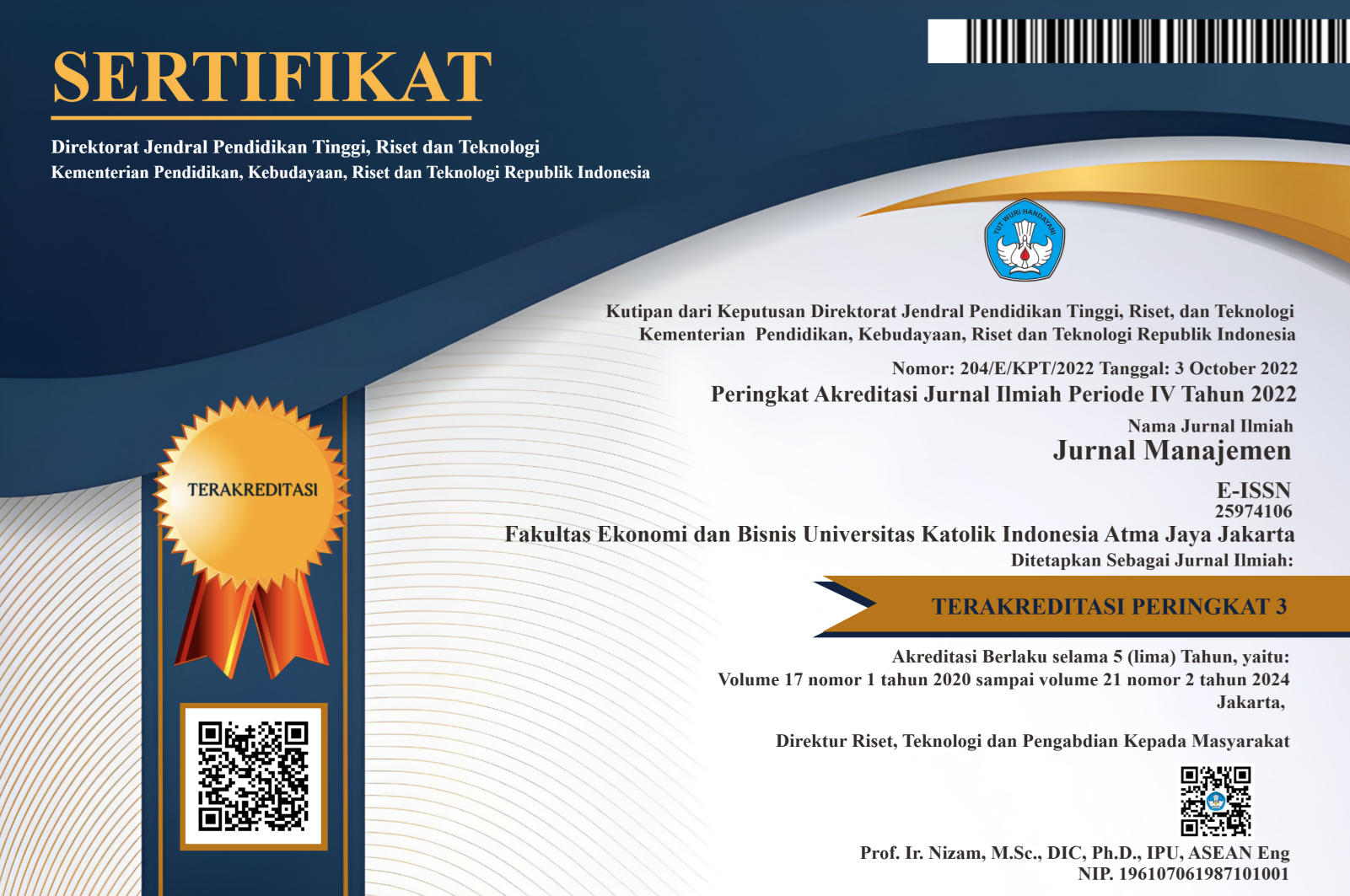PENGARUH JOB SATISFACTION TERHADAP ORGANIZATIONAL CITIZENSHIP BEHAVIOR (OCB) DENGAN ORGANIZATIONAL COMMITMENT SEBAGAI VARIABEL INTERVENING PADA RUMAH SAKIT PANTAI INDAH KAPUK DI JAKARTA
DOI:
https://doi.org/10.25170/jm.v11i2.823Keywords:
Job Satisfaction, Organizational Citizenship Behavior (OCB), Organizational CommitmentAbstract
The purpose of this research is to test the effect of job satisfaction on Organizational Citizenship Behavior (OCB) employees Hospital Pantai Indah Kapuk (RSPIK), Jakarta mediated by organizational commitment. Data was collected using a convenience sampling. There are 70 nurses, health workers and administration used as a sample. Data analysis methods used in this research is the analysis of the path by using analytical tools of Preacher-Hayes the Simple Mediation Model. The results of data processing using SPSS 22 for windows with macros and syntax. This research findings RSPIK employees have job satisfaction, organizational commitment and OCB are relatively high, where organizational commitment can be intervening variables on job satisfaction influence on organizational citizenship behavior (OCB) at Hospital Pantai Indah Kapuk in Jakarta.
References
Brown, S. P. & Robert A. P.. (1993). Antecedents and consequences of salesperson job satisfaction: meta-analysis and assessment of causal effects. Journal of Marketing Research, 30(1): 63-77.
Colquitt, Jason A., LePine, Jeffrey A., and Wesson, Michael J.. (2009). Organizational Behavior. Singapore: McGraw-Hill International Edition.
Greenberg, J. & Baron, Robert A.. (2003). Behavior in Organizations. New Jersey: Pearson Education, Inc.
Hayes, A.F. (2013). Introduction To Mediation, Moderation, And Conditional Process Analysis A Regression – Based Approach (Series Editor’s Notes by Little, D.T). The Guilford Press.
Johnston, M. W., Parasuraman, Charles M. F. & William C. B. 1990. A longitudinal assessment of the impact of selected organizational influences on salespeople’s organizational commitment during early employment. Journal of Marketing Research, 27 (3): 333-344.
Kreitner, Robert, & Angelo Kinicki. (2003). Organizational Behavior. Boston: Irwin/McGraw-Hill.
Lew Tek Yew. (2005). Job satisfaction and affective commitment: A study of employees in the tourism industry in Sarawak, Malaysia. Curtin University of Technology. Sunway Academic Journal, 4, 27-43.
Luthans, Fred. (2002). Organizational Behavior. New York: McGraw-Hill.
Mas’ud, Fuad. (2004). Survai Diagnosis Organisasional Konsep dan Aplikasi. Semarang: Badan Penerbit universitas Dipenogoro.
Meyer, J.P. & Allen, N.J.. (1997). Commitment in the Workplace: Theory, Research, and Application. Thousand Oaks, CA: Sage Publications.
Noor. (2011). Metodologi Penelitian. Jakarta: Kencana.
Organ, D. W., Podsakoff, P. M., & MacKenzie S. P.. (2006). Organizational citizenship behavior: Its nature, antecedents, and consequences. London: Sage Publications.
Preacher, K.J. & Hayes, A.F.. (2004). SPSS and SAS Procedure for Estimating Indirect Effects in Simple Mediation Models. Behavioral Research, Instruments and Computers, (4), 717-731.
Preacher, K.J. & Hayes, A.F. (2008). Asymptotic and Resampling Strategies for Assessing and Comparing Indirect Effects in Multiple Mediator Models. Behavior Research Methods, (40), 879-891.
Robbins, Stephen P., & Judge, Timothy A.. (2013). Organizational Behavior (15th ed.) Global Edition. England: Pearson Education.
Schappe, Stephen P. (1998). The Influence of Job satisfaction, Organizational Commitment, and Fairness Perceptions on Organizational Citizenship Behavior. The Journal of Psychology, 132, 3, ProQuest pg. 277.
Sekaran, Uma. (2003). Research Methods for Bussiness A Skill Building Approach. New York. John Wiley and Sons.
Wexley, K. N. & Yukl, L. A.. (1988). Organizational Behavior and Personnel Psychology. Boston: Richard D. Irwin, Inc..
Williams, L. J., & Anderson, S. E.. (1991). Job satisfaction and organizational commitment as predictors of organizational citizenship and in-role behaviors. Journal of Management, 17(3), 601–617.
Downloads
Published
Issue
Section
License
Authors who publish with this journal agree to the following terms:
Authors retain copyright and grant the journal right of first publication with the work simultaneously licensed under a Creative Commons Attribution-NonCommercial-ShareAlike License that allows others to share the work with an acknowledgement of the work's authorship and initial publication in this journal.
Authors are able to enter into separate, additional contractual arrangements for the non-exclusive distribution of the journal's published version of the work (e.g., post it to an institutional repository or publish it in a book), with an acknowledgement of its initial publication in this journal.
Authors are permitted and encouraged to post their work online (e.g., in institutional repositories or on their website) prior to and during the submission process, as it can lead to productive exchanges, as well as earlier and greater citation of published work (See the Effect of Open Access).












